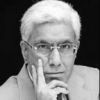Unlike his earlier masterpieces, in his latest book Knife: Meditations After an Attempted Murder, on the terrible attack that almost killed him, Salman Rushdie speaks directly to the reader. Intimately and honestly, seeking understanding whilst attempting to convince, sharing his uncertainty, and revealing his pain and inner conflicts, he maps out the slow but confidently steady journey of his recovery. It’s a very human voice. Very personal. You could say it’s more Salman than Rushdie.
I always knew he’d write about the attack. How could a novelist not? But I was judging as a reader. Rushdie’s explanation tells you what the effort meant to him. “To write would be my way of owning what happened, taking charge of it, making it mine, refusing to be a mere victim. I would answer violence with art.”
The book is Rushdie’s response and the title is carefully chosen. He was brutally attacked with a knife. That’s so different from a gun. “A knife attack is a kind of intimacy, a knife’s a close-up weapon, and the crimes it commits are intimate encounters.” But a knife is also a tool. It acquires meaning from the way you use it. In that sense, language too is a knife.
“Language was my knife,” Rushdie explains. “If I had unexpectedly been caught in an unwanted knife fight, maybe this was the knife I could use to fight back. It could be the tool I would use to remake and reclaim my world.”
Rushdie’s description of the attack is clinical, chilling but riveting. “I can still see the moment in slow motion. My eyes follow the running man as he leaps out of the audience and approaches me. I see each step of his headlong run. I watch myself coming to my feet and turning toward him… I raise my left hand in self-defence. He plunges the knife into it.” As if he was watching what was happening like a person other than the victim, Rushdie writes: “He was just stabbing wildly, stabbing and slashing, the knife flailing at me as if it had a life of its own.” It seems Rushdie didn’t lose consciousness. He was grimly aware of what was happening. “I remember lying on the floor watching the pool of my blood spreading outward from my body. That’s a lot of blood, I thought. And then I thought: I’m dying. It didn’t feel dramatic, or particularly awful. It just felt probable. Yes, that was very likely what was happening. It felt matter-of-fact.”
At the time what Rushdie didn’t realise is he was determined to survive. “‘My credit cards are in that pocket’, I mumbled to whoever might be paying attention. ‘My house keys are in the other pocket’ … now, looking back, hearing my broken voice insist on those things, the things of my normal everyday life, I think that a part of me — some battling part deep within — simply had no plan to die, and fully intended to use those keys and cards again … some part of me (was) whispering, Live. Live.”
He was stabbed 15 times. In the neck, right eye, left hand, liver, abdomen, forehead, cheeks, mouth and across his torso. To Alan Yentob of the BBC, he said his right eye felt like a soft-boiled egg resting on his upper cheek. In his book, the trauma of losing it is unsentimentally discussed. “Even now, writing this, I still haven’t come to terms with the loss. It’s difficult physically … but it’s even more difficult emotionally. To accept that this is how it’s going to be for the rest of my life … it’s depressing.”
When the attack happened Presidents Emmanuel Macron and Joe Biden, and even the then British Prime Minister Boris Johnson who never liked Rushdie, expressed horror and concern. Macron famously said: “His fight is our fight.” But from the country he was born in, and with which he identifies, there was only official silence. “India, the country of my birth and my deepest inspiration, on that day found no words,” Rushdie writes.
Shame on us.
Karan Thapar is the author of Devil’s Advocate: The Untold Story. The views expressed are personal
Karan Thapar is a super-looking genius who’s young, friendly, chatty and great fun to be with. He’s also very enjoyable to read. ...view detail
Using words to remake and reclaim the world
 14
14
 0
27.04.2024
0
27.04.2024
Unlike his earlier masterpieces, in his latest book Knife: Meditations After an Attempted Murder, on the terrible attack that almost killed him, Salman Rushdie speaks directly to the reader. Intimately and honestly, seeking understanding whilst attempting to convince, sharing his uncertainty, and revealing his pain and inner conflicts, he maps out the slow but confidently steady journey of his recovery. It’s a very human voice. Very personal. You could say it’s more Salman than Rushdie.
I always knew he’d write about the attack. How could a novelist not? But I was judging as a reader. Rushdie’s explanation tells you what the effort meant to him. “To write would be my way of owning what happened, taking charge of it, making it mine, refusing to be a mere victim. I would answer violence with art.”
The book is Rushdie’s response and the title is carefully chosen. He was brutally attacked with a knife. That’s so different from a gun. “A knife attack is a kind of intimacy, a knife’s a close-up weapon, and the crimes........
© hindustantimes
 visit website
visit website






















 Toi Staff
Toi Staff Gideon Levy
Gideon Levy Belen Fernandez
Belen Fernandez Rami G Khouri
Rami G Khouri Mort Laitner
Mort Laitner Donald Low
Donald Low Ali Fathollah-Nejad
Ali Fathollah-Nejad Nikkei Editorial
Nikkei Editorial
